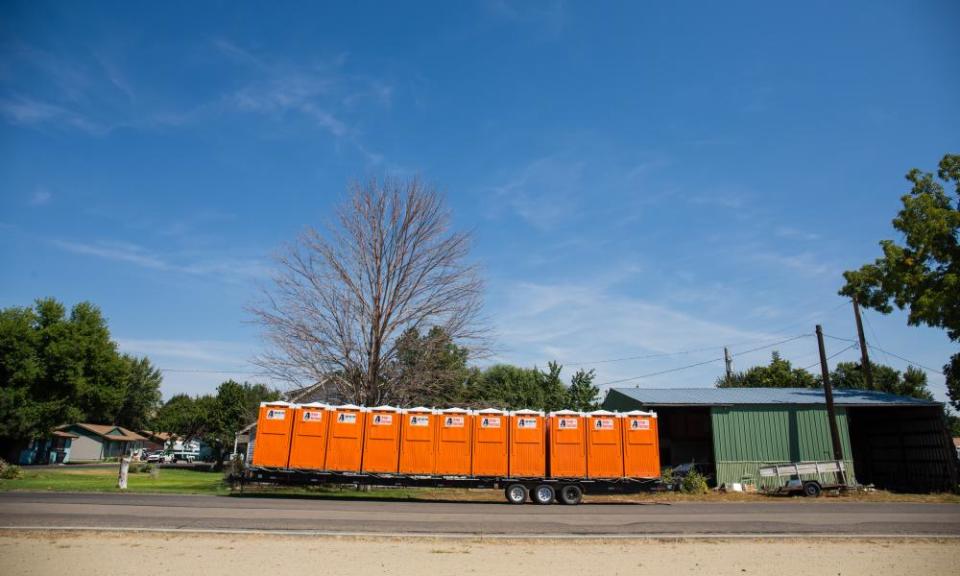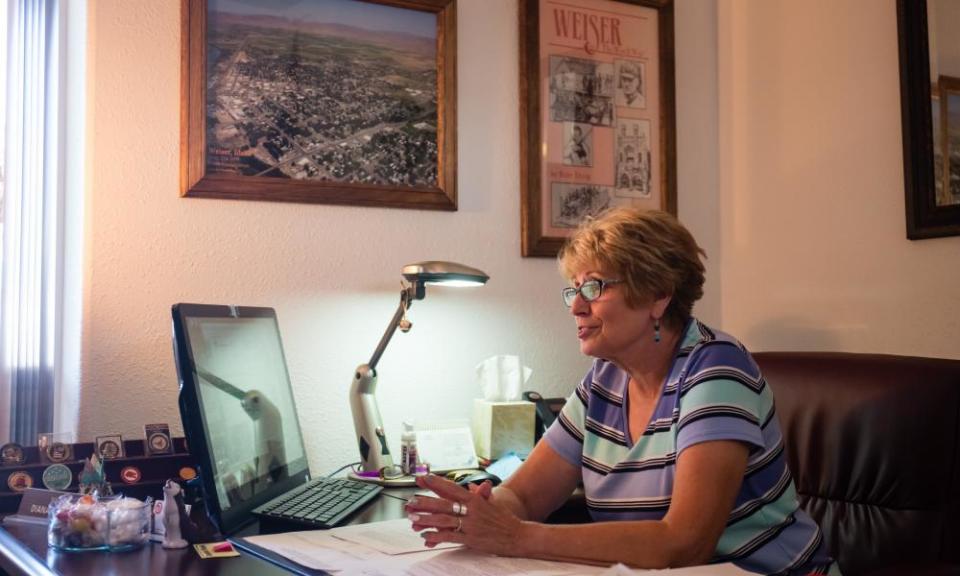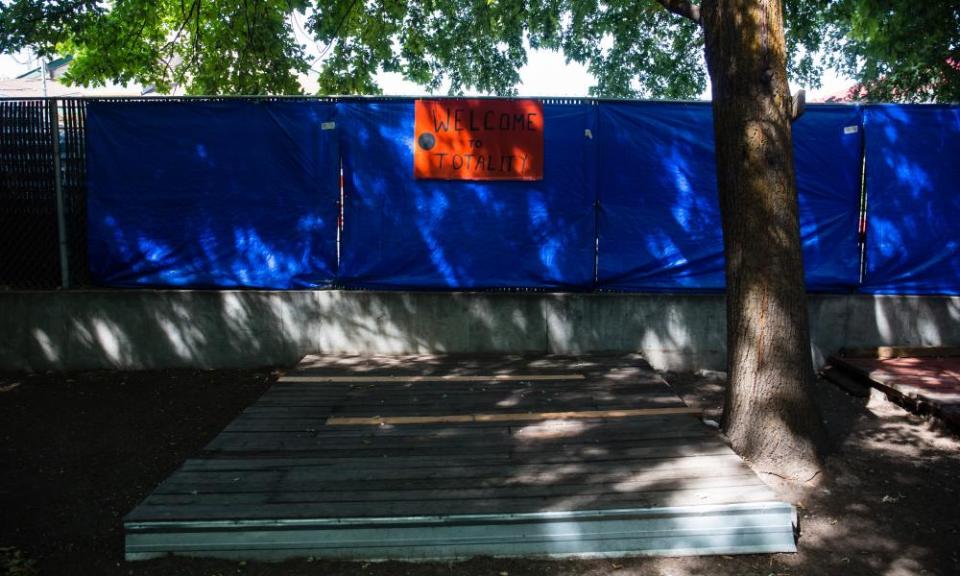Porta-potties, police, prayers: how a tiny Idaho town gets ready for the eclipse

The portable toilets began arriving in Weiser, Idaho, on Tuesday, the first of around 70 orange outhouses ordered by local agengies for the Great American Eclipse.
They will serve a crowd that could reach 70,000 by the time this tiny town on the Oregon border is plunged into total darkness on Monday.
You don’t even have to do the math. Patrick Nauman will do it for you: “It’s about a thousand per ... It’s all we could get.”
Nauman, chairman of Eclipse Fest 2017 and co-owner of Weiser Classic Candy, where eclipse cookies sell for $2.50 a pop, views the once-in-a-lifetime astronomical event as “a huge opportunity. I look at this as Mother Nature’s apology for the hard winter. This is a big economic shot in the arm.”
Mayor Diana Thomas, however, is not so sunny. Some in her struggling town, she notes wryly, are asking, “Why is God mad at us? Two things like this in one year?”
First, a record cold winter and two months of record snowfall caused the roof to collapse on Weiser’s only grocery store and took out the bowling alley, among other buildings. The market reopened but the bowling alley’s a goner.
And now comes the eclipse, which has cast a pall of uncertainty over this Idaho town, population 5,507.
The last time a solar eclipse’s path of totality crossed the US from Pacific to Atlantic was 1918. And, as the Idaho department of commerce-tourism development notes on its website, “there won’t be another one in Idaho for 152 years!”.

While the tourism department exhorts travelers to “make plans to be part of this amazing experience”, the transportation agency warns that hundreds of thousands of people are expected to descend on this rural state. And it cautions visitors: bring paper maps and lots of water. Make sure your gas tanks are full. Please, don’t set the tinder-dry state on fire.
Wariness was on full display Monday evening, during Weiser’s last pre-eclipse city council meeting.
It started with an invocation by pastor Kevin Bettinger: “I pray for our people that protect us. I pray for the people that make decisions. I pray for the events that we have coming up here in our area with the eclipse and all the many details.”
That got a very loud group “amen”. Then police lieutenant Troy Krahn outlined the city’s preparations.
The 12-person police department has borrowed two officers from the nearby town of Emmett. Police will work 10-to-12 hour shifts during the five days of festival and eclipse.
The school district will run shuttle buses from parking areas to the festival site at Memorial Park. Fire trucks will be placed in strategic spots to avoid getting stuck in traffic should disaster strike.

Because traffic is probably the major headache.
There’s a technical term for Weiser’s location: the middle of nowhere. It is reachable via three two-lane highways and more than half of the eclipse-viewers streaming into Weiser (rhymes with “geezer”) are expected to arrive on Monday. Or they’ll try to.
On 14 August, Nauman said the estimated driving time from Boise, the state capital, will be somewhere between five and eight hours, instead of the normal 90 minutes. On 15 August, mayor Thomas revised the commute time up – to somewhere between 10 and 10.5 hours.
And then there’s the question of accommodations. Right now, the best you can expect is a spot to pitch a tent on the grounds of Weiser High School, home of the Wolverines, or, maybe, in someone’s back yard. For a price, of course.

Weiser High has already rented out more than 170 camp sites of 300 available on school grounds. A hundred bucks rents one spot for Friday, Saturday and Sunday nights, with space for two tents and one vehicle.In addition, the school has rented out 200 parking spots at $10-per-day per spot.
The cheerleaders will operate a food booth Monday. The girls’ soccer team and the science club will have an information booth all weekend, complete with eclipse glasses for sale. The track club will sell water and coffee.
“The big question is if 60,000 people try to get into Weiser at the same time Monday, is that possible?” principal Dave Davies wondered, adding. “I’d just be sad if someone had their heart set on viewing the eclipse and had to see it from their car on US Route 95.”
By 15 August, Jim Metzger had already turned away around 50 pilots who wanted to reserve space at the city’s airport. There are usually 14 tie-downs, said the airport manager; he’s capped it at 118 for the eclipse and expects pilots and passengers to camp beneath their airplane wings.
Weiser only has three motels for a total of 40 or 50 rooms. All were booked at least a year ago.

Matt Penn found that out the hard way.
Penn is an astronomer with the National Solar Observatory. For Monday’s eclipse, he’s directing a coast-to-coast experiment called CitizenCATE, with telescopes recording at 68 sites along the path of totality from Oregon to South Carolina. Because Weiser is so small and the weather is so good, Penn said, he chose the town as his base.
Penn – who said he was “totally excited” – is so eager that he called each motel five months ago to book a room for him and his family.
No go. Instead, they’ll be bunking at the home of Weiser’s schools superintendent.
Once the heavens return to normal Monday, Penn plans to head home.
He will leave Weiser via a two-lane country highway. Along with 70,000 or so other astronomy buffs. More or less at the same time.
That’s the moment that has mayor Thomas most concerned.
“How,” she asks, “do we get people out of here when it’s over?”

 Yahoo News
Yahoo News 